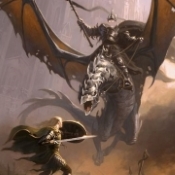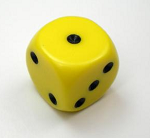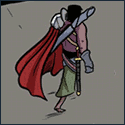|
dmnz posted:Serious post. rest frequency doesn't fix rate of change problems unless you're increasing the number of fights between rests at every level, which sounds awful. it also breaks down the second you have some climactic fight that's more important than the other ones Cthulhu Dreams posted:Part of 40ks problem is the inability to respond to the opponents list. If we are playing a 2k game and I have 2k of guard painted, I'm bringing that regardless of if you are bringing a horde list or some mechanized thing. this is a real problem, but it's one that basically every other miniatures game handles better
|
|
|
|

|
| # ? May 4, 2024 03:23 |
|
Jeb Bush 2012 posted:rest frequency doesn't fix rate of change problems unless you're increasing the number of fights between rests at every level, which sounds awful. it also breaks down the second you have some climactic fight that's more important than the other ones Granted, more encounters, and more difficult encounters between rests is necessary, and not thats much of a problem imo. It's up to the players to keep some resources in reserve for a climactic fight. There is no tension in the game otherwise.
|
|
|
|
My solution to the wizard problem was always to be careful about what spells the wizards actually find (and therefore can use) in spellbooks, but the fact that D&D makes you go through that level of effort to balance your game is kind of ridiculous.
|
|
|
|
dmnz posted:Granted, more encounters, and more difficult encounters between rests is necessary, and not thats much of a problem imo. you completely missed the point, which is that the "rest-limited" character will still be much stronger in the fights that actually matter. and yes, increasing the number of encounters per rest more and more as you go up in level is obviously a problem, wtf you're also pretty obviously wrong if you think the only source of tension in the game is resource conservation, although that's not particularly relevant Avenging Dentist posted:My solution to the wizard problem was always to be careful about what spells the wizards actually find (and therefore can use) in spellbooks, but the fact that D&D makes you go through that level of effort to balance your game is kind of ridiculous. this is also not a great solution, but fortunately there *is* a good solution, which is to play a game that bothered to balance it's spellcaster classes against its non-caster classes. you can even do so while still playing d&d!
|
|
|
|
My favorite thing to do in games of DnD is to cast grease and try to wrestle my opponents in it like the sexy gnome I am. It's cool because I am always the most useless, dead weight person in the party, and carrying my obstructionist rear end around the campaign acts as a natural counter balance to any power gaming aspirations people have.
|
|
|
|
dmnz posted:Granted, more encounters, and more difficult encounters between rests is necessary, and not thats much of a problem imo. Yeah it seems like you don't understand what the whole linear fighter, quadratic wizard stuff is about and I assume its just because you've never seen one in action. What people refer to is the wizard gets exponentially more powerful at solving problems than a fighter. Hell for the most part a fighter will do more raw numbers damage than a wizard. Thats not the issue, the issue is that a wizard plops out a spell and completely designs the nature of the universe and the entire setting at a whim while the fighter...just keeps hitting stuff. A level 5 wizard can fly, something that is completely world breaking for the most part, it makes several skills irrelevant and means everything you ever build or design has to take into account the capacities of the wizard to completely overcome it with such a low level spell. It provides exponential narrative control versus the fighter who still has to treat the world as some realistic setting where he would need to worry about poo poo like rope to help climb a wall. Higher level characters turn into a game where a fighter is doing slightly more damage than they did before while the wizard gets to become immortal and build their own pocket dimension where they have a horde of demons and genies farming infinite gold and leading an invasion into the plane of gold or whatever the gently caress he wants any time he wants. The idea that wizards can trivialize an encounter with a spell or two is hilariously the least ridiculous thing they can do and after a few levels the amount of spells a wizard can get is so large that the limited resource (their spell count) doesn't matter any more. The fighter's limited resource (his health) is going to burn down at a much faster rate than the wizard's so you'll need to rest anyway.
|
|
|
|
Jeb Bush 2012 posted:
What game are you talking about here?
|
|
|
|
kingcom posted:Yeah it seems like you don't understand what the whole linear fighter, quadratic wizard stuff is about and I assume its just because you've never seen one in action. What people refer to is the wizard gets exponentially more powerful at solving problems than a fighter. Hell for the most part a fighter will do more raw numbers damage than a wizard. Thats not the issue, the issue is that a wizard plops out a spell and completely designs the nature of the universe and the entire setting at a whim while the fighter...just keeps hitting stuff. Fair enough. I have not seen it take to such an extreme.
|
|
|
|
dmnz posted:Fair enough. I have not seen it take to such an extreme. A few of us here are refugees from the old grognards.txt threads. We have experienced these things, and we are very opinionated about them for good reason. A lot of them sound like funny hypotheticals, but hoo boy if you actually played a campaign long enough with one of "those guys." There wouldn't be as much of a problem if book of 9 swords was also standard, but go figure that a lot of
|
|
|
|
dmnz posted:What game are you talking about here? Chill la Chill posted:A few of us here are refugees from the old grognards.txt threads. We have experienced these things, and we are very opinionated about them for good reason. A lot of them sound like funny hypotheticals, but hoo boy if you actually played a campaign long enough with one of "those guys." There wouldn't be as much of a problem if book of 9 swords was also standard, but go figure that a lot of it's not really a "those guys" problem, a wizard that just takes some save-or-suck spells is way better than a core fighter (assuming from the bo9s references you're talking about 3.5e)
|
|
|
|
Or just play Gloomhaven.  Jeb Bush 2012 posted:4e d&d Yeah. An average wizard player would take those no-brainer spells. I guess I should've said it from the other side, which is that unless someone deliberately gimps their wizard, you are definitely running into that problem.
|
|
|
|
Chill la Chill posted:Or just play Gloomhaven. Theres a tonne of rpgs that do the dnd thing while being way better at not having the game fall apart because of poor rules at this point. Honestly the last wizard players i've run into were the first i've ever encountered who didn't instinctively go straight to the spells that break the game apart and instead are going for damage spells (especially bad ones like acid arrow) over anything else. It was a bit of a shock to see the wizard be the most ineffectual character and made me assume everyone who said they are fine just had players like this in their groups.
|
|
|
|
Wouldn't it be down to player agency, though? Fighters are restricted by their items but they're also enabled by them, right? What's to stop the fighter from saying to the DM, "I want some boots that make me run fast and fly high! Give me some Cocaine Clogs, man!"?
|
|
|
|
Irate Tree posted:Wouldn't it be down to player agency, though? Fighters are restricted by their items but they're also enabled by them, right? What's to stop the fighter from saying to the DM, "I want some boots that make me run fast and fly high! Give me some Cocaine Clogs, man!"? fighters have literally zero extra ability to use items compared to any other class though?
|
|
|
|
Irate Tree posted:Wouldn't it be down to player agency, though? Fighters are restricted by their items but they're also enabled by them, right? What's to stop the fighter from saying to the DM, "I want some boots that make me run fast and fly high! Give me some Cocaine Clogs, man!"? Then the wizard goes 'I would also like an item that lets me do something cool'. Jeb Bush 2012 posted:fighters have literally zero extra ability to use items compared to any other class though? Often they have less ability to use items because they created a Use Magic Item skill that wizards have access to and fighters don't. Also wizards have the ability to make their own magic items while a fighter can't.
|
|
|
|
Being able to make wands was one of those other things that more or less made the whole spell slot limitation meaningless.
|
|
|
|
Avenging Dentist posted:Not 100% sure what you mean but I'll take a guess. Models have a standardized base size plus a height value (small, medium, large, huge, gigantic). You have line of sight to a target if there are no models/terrain pieces in the way that are the same size or larger than the target. (This does mean that a little guy might be able to shoot a big guy but not vice versa. However, I'm fine with that from a game balance point of view.) Basically what I was looking for; thanks.
|
|
|
|
MCPeePants posted:In my continued shilling of Runewars, I like its solution. Premeasuring distance is completely legal (though not the movement templates so curved paths are less predictable) so both players can have perfect understanding of the ranges involved, but the initiative-based alternating activation system means NOTHING IS CERTAIN. Longer moves come later in the turn, so if your unit can cover distance earlier than the enemy's then you've got the advantage, but they might also be able to scoot backwards out of range or brace for impact. Similarly, a late turn charge might hit an enemy that started out of range. The combination of actions and modifiers available to a unit, as well as the initiative at which they occur, do a ton to shape the flavour of each unit, all within the confines of the core rules. Could you expand on how the activation system works?
|
|
|
|
Cthulhu Dreams posted:Part of 40ks problem is the inability to respond to the opponents list. If we are playing a 2k game and I have 2k of guard painted, I'm bringing that regardless of if you are bringing a horde list or some mechanized thing. This would be much less of a problem if objectives were tied to lists. There's no reason why Tau and Imperial Guard should be playing to the same victory conditions. So even if the IG player can't really do anything against the Tau armor, they can still win by meeting the objectives hard baked into their list.
|
|
|
|
anti_strunt posted:Could you expand on how the activation system works? Basically, you have nine initiative rounds, and you dial in an action that has an initiative number associated with it secretly before anything happens. Then everyone with a 1 on their action reveals their dial and acts first, then 2,3,4,etc. This makes some actions and units much slower than others but newer players might be a bit frustrated at the need to know what the opponent's dial looks like to know what's possible.
|
|
|
|
The rune wars activation system is great! I think that given enough experience, the "hidden initiative" portion will be less hidden once everyone is familiar with the dials. There's only so much each unit can do because their stats are rather specific with their roles. I do like that system though since it really punishes lack of foresight when attempting to charge. The only potentially negative part about the game is the puzzle-shaped bases. If people get good enough at them, you can get into situations where you slide sideways to avoid a charge because the puzzle portion sticking out won't connect. You could say this happens in any measuring game, but given that you now have the choice for manipulating these ranges, this can be seen as either a good or bad thing. Having played x-wing long enough, there are people good enough to judge the difference in mm's pretty readily. My friend and I enjoy playing the game but we agreed that we'll just write down movements on paper and proxy the minis with our historical/WHFB stuff because we already have them. Der Waffle Mous posted:Being able to make wands was one of those other things that more or less made the whole spell slot limitation meaningless. Some of the most fun I've had playing RPGs was a campaign we had that treated wizards' spells as the Vancian ammunition they were. We had a bunch of gunslingers playing in a Western, more or less. Funny thing is that this was done in 4e using dark sun rules.
|
|
|
|
Panzeh posted:Basically, you have nine initiative rounds, and you dial in an action that has an initiative number associated with it secretly before anything happens. They do have a reference chart for what all the dials in the core set are, anyway, so that's nice. (Back of one of the rulebooks, I think the quick play one.)
|
|
|
|
Atlas Hugged posted:This would be much less of a problem if objectives were tied to lists. There's no reason why Tau and Imperial Guard should be playing to the same victory conditions. So even if the IG player can't really do anything against the Tau armor, they can still win by meeting the objectives hard baked into their list. this was honestly one of the neater ideas that the previous edition of Heavy Gear Blitz had. Each side had their own objectives, and who won the match depended on how many of a team's objectives were achieved. On top of this it tied into army creation; a more elite FOC took a penalty to their victory conditions, while a greener/poorly equipped force had a bonus. So theoretically a tier 1 special forces gear army vs. bubba's backwater militia would've been balanced by the elite army basically needing to get all of their objectives while bubba basically need only not get wiped off the table to force a draw. Granted it probably didn't work anywhere near this well in reality but I really liked the idea.
|
|
|
|
Ilor posted:Wow, terrible opinions - your mom jumps like a meth-fueled pogo-stick and basketball is neither cool nor good. You're making fair points. We're not all clones of one another, and we have natural strengths and weaknesses which will affect our ability to be competitive in any real game. However, I feel like we tend to make distinctions between physical and mental attributes, particularly with games; we usually distinguish games from sports, and while there are certainly games that have physical elements, we usually see those as somewhat distinct from the norm. But let's also be fair: I did not claim that prohibiting pre-measuring was "universally bad" either. I included it in a list of attributes of 40k that make 40k bad; it's part of a whole, not on its own a game-killer.
|
|
|
|
While Firefight is never going to beat 40k it did do the objective thing correctly, the Asterians (read: Necron-Eldar) can gain VP for squads NOT destroyed at the end of the game, for example. (because they're all about the balance), or friendly squads which teleport safely out (but closer to the end of the game) get more VP.
|
|
|
|
Dark Age also has a cool system for secondary objectives. There's a pool of 36 secondary objective cards, and you generate a deck of 16+ of them. Then at the beginning of each turn, you draw secondary objectives until you have 2; at the end of the turn, you can discard one. If you meet the conditions of the secondary objective, you then reveal it to your opponent and get the victory points (usually just 1 but some are worth 2). This lets you create a pool of secondary objectives that works well for your play style, and even if you don't draw one you like, you have a few chances to discard and re-draw an objective that you can complete.
|
|
|
|
Sounds neat - but it CAN be overwhelming. I'm thinking particularly of Malifaux where you have a strategy condition to win the game, then you have two schemes randomly determined, and then two schemes that are always available: and you have to pick two schemes and bear in mind the strategy at the same time. I don't know why I played that game so much, tbh.
|
|
|
|
I'm trying a "new" (2011) game this weekend called Bushido by GCT studios. All the rules are free online, including unit cards. I say new because my friend saw a review about it on SUSD during a recent games expo and the comments were intriguing. I have to check the charts again later but I think the charts actually had Xd6 curves in mind for the numbers.
|
|
|
|
I've always liked asymmetric objectives, including those where you may not necessarily know what your opponent is trying to accomplish. It changes the very staid dynamics of "attacker vs defender" or "meeting engagement" to which most tabletop games seem to default. This is especially true when your objectives have some kind of tension to them (keep the enemy from occupying this particular position, but also safely get as many units off the board as you can - or - destroy this object/terrain feature deep in enemy territory, but minimize your own casualties). It means very different things in terms of force composition and play style (as one of the above examples rewards resilience, whereas the other rewards mobility). When done correctly, I feel like having well-designed asymmetric objectives yields an organic "scenario" without needing extra scenario rules. It also opens up the possibility that both sides can accomplish their objectives at the same time, which is cool (the enemy staged a major breakthrough, but friendly forces still hold a critical supply depot). And if you can figure out what your opponent is trying to accomplish, you can then be faced with the choice of whether you're better off sticking to your original plan or putting the brakes on your opponent's attempts to complete his or her objectives. I also feel like a well-designed system like this would lend itself very well to campaigns, be they map-based, ladder-based, tree-based, narrative, or whatever, where your successes or failures in one battle would influence your objectives for later battles. Tying objectives to army composition is intriguing, and I am interested to know more about how Heavy Gear and Dark Age do it.
|
|
|
|
In my head for 40k it would be something like if you pick a troops worth of IG, then X points would need to die on an objective. Not hold it at the end, but you need to throw lives away in the name of the Imperium. And that would be an objective hard baked into the unit's entry. Spitballing, you wouldn't want an objective for every unit in the army, but maybe every Troop would have one and then you'd be motivated to pick other entries to support the objectives you ended up with thus creating really thematic lists. Though I don't know if 40k kept the old composition structure, but I'm sure you could do something comparable with whatever they have now.
|
|
|
|
Most of the problems come from the structure of making your army, *then* choosing a mission, which is bonkers. Sure, I get it for tournaments, where there may be several types of missions/scenarios you run through, but wargames should generally go "pick an opponent > determine mission/scenario > agree on game size > build armies > play" Tying objectives to army construction is a fine idea but only necessary if you aren't able to build armies to accomplish the mission objective in the first place and have to rig it to look like your army was built to accomplish whatever objective you ended up with
|
|
|
|
Dark Age handles that by having tournament play allow a 150 point sideboard (for a 750 point game). You also use the same secondary objective deck for the entire tournament, so you have to think about all the possible missions you might be forced to play. I like this as a compromise where you have to think about how to ensure your force is flexible enough to win a variety of scenarios without locking it down completely.
|
|
|
|
For Infinity tournaments, you know the mission scenarios ahead of time (allowing you to plan your force accordingly), and you are allowed to bring two different lists. You only pick which list you're using after you a) see the table, and b) know what faction your opponent is fielding. This seems to work pretty well, and gives you more flexibility than a fixed-list system would without the need for a sideboard. EDIT: And if secondary objectives are in play, you draw two and pick one. This means you rarely have an objective you just can't accomplish, and you always have the option to secure your enemy's HVT instead. Ilor fucked around with this message at 20:32 on Jun 15, 2017 |
|
|
|
The problem for a game like 40k is that it's pretty challenging to bring your entire collection, and then build lists based on who you are playing and what the scenario is. It's way more likely that you'll have some sort of core list you intend to use, and then maybe a few options if you want to make some quick changes prior to playing. Maybe you can do it by pre-planning a game or two in advance, but then any subsequent games are going to be more or less the same force. If the game size is small enough that you can bring two full armies with you it's one thing, but if you have potentially scores of figures plus large models it's limiting. Around when I stopped playing, there was also the issue that if you knew your opponent and the scenario ahead of time, the existing imbalances in the game would be insurmountable. Like there was a period where there were really only one or two general Eldar lists that were playable (not like, top tier, but gave you any chance of winning). If your opponent was playing one of the better armies knew you were playing Eldar and had some idea of your scenario, they basically knew exactly what you would have to bring to not simply get stomped to death and could more or less build against it. Your only hope was that they'd be bringing a more general list designed to handle different armies and situations and it wouldn't be designed to exploit all your terrible failings.
|
|
|
|
Saw a few guys at my FLGS playing NeoMunda. Spent more times bickerig, arguing about the spirit of the rules, and passive-aggressively sniping at each other. I'm willing to grant to GW a certain mesure of improvement but huh... that's no great.
|
|
|
|
Leperflesh posted:You're making fair points. We're not all clones of one another, and we have natural strengths and weaknesses which will affect our ability to be competitive in any real game. However, I feel like we tend to make distinctions between physical and mental attributes, particularly with games; we usually distinguish games from sports, and while there are certainly games that have physical elements, we usually see those as somewhat distinct from the norm. In my mind it's a question of what skills you're testing and how related they are to the overall goals of the game and the expectations you've set for the design. There are games with coordination or range-guessing elements or whatever else that use them intelligently as part of a vision for a fun game. But I've never gotten that impression from GW. It feels like they've used those elements either in service of some kind of strange realism (the "guess" range artillery 40k had for a while, though that's not really realistic since even Napoleonic artillery officers used math rather than guesswork) or, I suspect, because on some level they think it compensates for some of 40k's flaws. When you have a game with perfect micromanagement control over each individual soldier, if you can pre-measure it turns out that it both takes forever as people optimize their moves, and the correct move is often pretty obvious, making most game actions take a while to resolve but in uniteresting ways. That's my objection to the use of "guess" in 40k - I don't think it addresses either of those issues very interestingly, because you could address them in ways that enhances tactical depth, and 40k feels like it wants to be a tactical game, not a range estimating one. If nothing else, it's way overcomplicated if it is.
|
|
|
|
guess ranges haven't been a thing in 40k for years. You've been able to pre-measure everything for at least the last 2 editions e: Realize you seem to be pointing that out, but also addressing LF's earlier comment TheChirurgeon fucked around with this message at 00:01 on Jun 16, 2017 |
|
|
|
TheChirurgeon posted:guess ranges haven't been a thing in 40k for years. You've been able to pre-measure everything for at least the last 2 editions Yeah, exactly, though I think randomized charge ranges are similarly not a very satisfying solution to the micromanagement problem compared to limited command resources or something like Runewars. But I also haven't played 40k in a while so I don't remember if those are still in.
|
|
|
|
Ultiville posted:Yeah, exactly, though I think randomized charge ranges are similarly not a very satisfying solution to the micromanagement problem compared to limited command resources or something like Runewars. But I also haven't played 40k in a while so I don't remember if those are still in. Yeah randomized charge ranges as they've implemented them are pretty bad, but I understand *why* they kept it moving to the new edition--the new edition allows for deep striking units to be placed anywhere outside of a certain distance from enemy units, which without random charge distances means either absolute certainty of being able to charge into close combat immediately or not being able to. The latter is less preferable overall I think, as it really hurts melee units in a game that already favors ranged weapons for a number of reasons, but making it certain also wouldn't have a positive outcome either. I'm of the mind that the distance itself is more problematic--2D6" has too much variance--and the range just needed to be more predictable to make it easier (but not certain) to predict charging. That said, 8th edition also introduced a limited command resource (Command Points) that the game has needed for a long time, and helps smooth out some of those issues by re-rolling bad rolls. They weren't around before 8th, and they aren't currently being used enough in the ruleset that was released, but the current idea is that they'll be adding in faction-specific uses for them. As-is, their more interesting uses tend to be tied to specific missions/scenarios, which is fine. And a lot of these issues could have been easily solved with alternating unit activations, which GW should have implemented. But baby steps, I guess Ilor posted:For Infinity tournaments, you know the mission scenarios ahead of time (allowing you to plan your force accordingly), and you are allowed to bring two different lists. You only pick which list you're using after you a) see the table, and b) know what faction your opponent is fielding. This seems to work pretty well, and gives you more flexibility than a fixed-list system would without the need for a sideboard. All well and good for tournaments, but ideally the game you play is balanced enough that knowing the mission and opponent in advance don't guarantee you a victory, especially if the opponent has the same knowledge. No idea how 8th edition 40k is going to fare on that front. Seems much more balanced than 7th, but that is like the lowest possible bar to clear.
|
|
|
|

|
| # ? May 4, 2024 03:23 |
|
Chill la Chill posted:I'm trying a "new" (2011) game this weekend called Bushido by GCT studios. All the rules are free online, including unit cards. I say new because my friend saw a review about it on SUSD during a recent games expo and the comments were intriguing. I have to check the charts again later but I think the charts actually had Xd6 curves in mind for the numbers. I have some local gaming buds wanting to start a Bushido group. From what I've looked into it, it looks very very cool. I read that SUSD article today, too, and it has built up my interest quite a bit. Let us know what you think of it after you play a game or two.
|
|
|




























